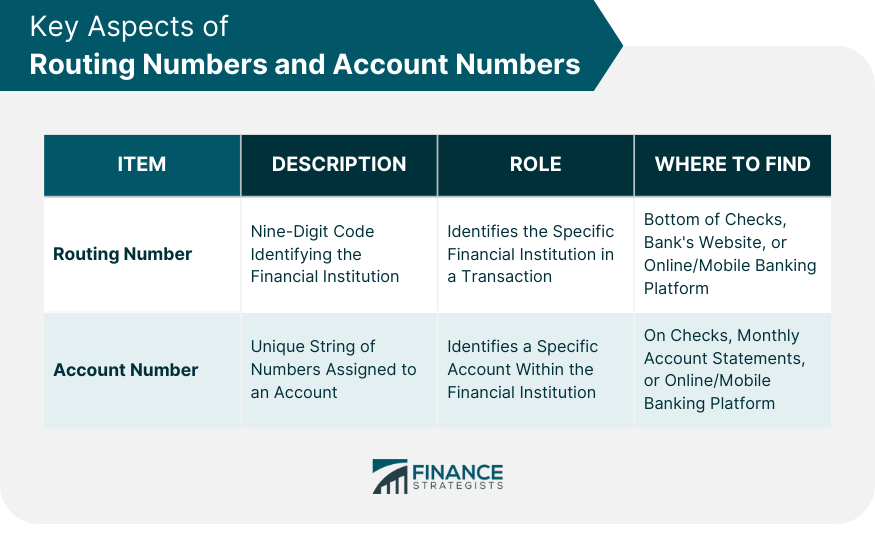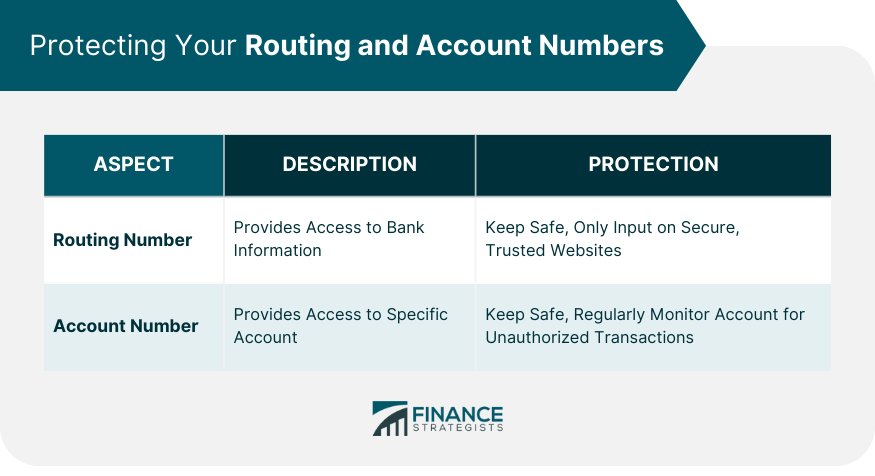A routing number and an account number are unique identifiers used in banking transactions. The main difference between the two lies in their purpose: a routing number, a nine-digit code, identifies the financial institution involved in a transaction, whereas an account number identifies a specific account within that institution. Both are crucial for the accurate transfer of money. For instance, when setting up direct deposits or automatic payments, both numbers are used to ensure the money reaches the correct account. It's also important to keep these numbers secure as they can be misused if fallen into the wrong hands. Understanding the roles of both these numbers helps in navigating financial transactions effectively and securely. A routing number, also known as an ABA (American Bankers Association) number, is a nine-digit code used to identify a financial institution in a transaction. It was initially created to facilitate the sorting and shipping of paper checks, but now it's also used for electronic transactions. The primary purpose of a routing number is to identify the specific financial institution involved in a transaction. Each bank or credit union has at least one unique routing number that sets it apart from other institutions. It's often required when setting up direct deposit, automatic payments, or wire transfers. Your routing number can be found in several places. The most common place is at the bottom of your checks, where it's the first set of nine-digit numbers printed on the bottom left. It's also often listed on the bank's website or within online and mobile banking platforms. An account number is a unique string of numbers assigned to each account held by an individual at a bank. This could be a checking account, savings account, or any other type of account offered by the institution. The account number serves as a specific identifier for your account. It helps banks direct the flow of money to and from specific accounts during transactions. Whether you're depositing money, setting up direct deposit, or paying bills online, your account number will be required. Your account number can typically be found on your checks (it's the second set of numbers from the left, following the routing number), on your monthly account statement, or through the bank's online or mobile platform. It's important to keep this number secure, as it provides direct access to your account. The main difference between a routing number and an account number lies in their purposes. While the routing number identifies the bank or financial institution, the account number identifies the specific account at that institution. Another difference is that while an institution will have at least one routing number that applies to all its customers, each account will have a unique account number. In every financial transaction, both numbers work together. The routing number points to the correct bank, and the account number directs the money to the specific account at that bank. The key similarity between the two lies in their function as unique identifiers in banking transactions. They are both critical for ensuring that money is accurately transferred between accounts. For domestic transactions, like setting up direct deposit or automatic bill payments, both the routing and account numbers are required. These numbers guide the transaction, ensuring the money reaches the correct account at the appropriate financial institution. For international transactions, the bank's SWIFT code or BIC (Bank Identifier Code) is often used instead of the routing number. However, the account number is still crucial to identify the specific account the funds should go to. In the digital realm, these numbers are used for online bill payments, mobile check deposits, and transferring funds between accounts at different banks. When you link your bank account to a digital payment app, for instance, you'll need both your routing and account numbers. Both numbers provide access to your bank account and should be kept secure. If they fall into the wrong hands, fraudulent transactions could occur, potentially leading to financial loss. If someone obtains your account number and routing number, they can potentially use this information to pay for purchases from your account or set up unauthorized direct debits. This is known as ACH fraud, and it can be difficult to detect until fraudulent transactions have already occurred. Keep your checks, statements, and any other document with these numbers safe. Be cautious when entering this information online and only do so on secure, trusted websites. Regularly monitor your account activity for any unauthorized transactions and report any suspicious activity to your bank immediately. Both routing numbers and account numbers play crucial roles in ensuring accuracy in banking transactions. They are unique identifiers – routing numbers recognize the financial institution involved, while account numbers single out an individual account within that institution. They're essential in domestic and international transactions, as well as online banking and digital transactions. Nevertheless, as they provide access to your bank account, it's critical to keep these numbers secure to avoid ACH fraud. By understanding these numbers, their differences, and their importance, you're equipped to navigate the financial landscape more effectively, contributing to your overall financial security and literacy. Remember, regularly monitor your account activity and promptly report any suspicious activities to your bank.Routing Number vs Account Number Overview
What Is a Routing Number?
Role and Purpose of a Routing Number in Banking Operations
How and Where to Find Your Routing Number
What Is an Account Number?
Role and Purpose of an Account Number in Banking Operations
How and Where to Find Your Account Number

Comparison and Contrast of Routing Number vs Account Number
Differences Between a Routing Number and an Account Number
Roles of Each Number in Identifying Transactions
Similarities Between Routing Numbers and Account Numbers
Importance of Routing Numbers vs Account Numbers in Different Transactions
Domestic Transactions
International Transactions
Online Banking and Digital Transactions
Protecting Your Routing Number and Account Number
Importance of Keeping Your Routing Number and Account Number Secure
Potential Risks and Consequences of These Numbers Being Compromised

Tips and Best Practices for Protecting Your Banking Information
Conclusion
Routing Number vs Account Number FAQs
The main difference between a routing number and an account number lies in their function. A routing number is used to identify a particular financial institution, whereas an account number identifies a specific account within that institution.
Your bank's routing number and your account number are typically found on your checks. The routing number is the first set of nine digits at the bottom left, while the account number follows directly after. You can also find these numbers on your bank's website or through your online banking platform.
For international transactions, a bank's SWIFT code or BIC (Bank Identifier Code) is often used instead of the routing number. However, your account number remains crucial as it identifies the specific account to which the funds should be transferred.
Technically, someone can use your routing number and account number to pay for purchases or set up unauthorized direct debits, known as ACH fraud. It's essential to keep these numbers secure and monitor your account activity regularly.
Understanding the difference between a routing number and an account number helps you navigate financial transactions more effectively. You'll need to know both numbers when setting up direct deposits, automatic payments, or wire transfers. This knowledge can also help in protecting against fraudulent transactions.
True Tamplin is a published author, public speaker, CEO of UpDigital, and founder of Finance Strategists.
True is a Certified Educator in Personal Finance (CEPF®), author of The Handy Financial Ratios Guide, a member of the Society for Advancing Business Editing and Writing, contributes to his financial education site, Finance Strategists, and has spoken to various financial communities such as the CFA Institute, as well as university students like his Alma mater, Biola University, where he received a bachelor of science in business and data analytics.
To learn more about True, visit his personal website or view his author profiles on Amazon, Nasdaq and Forbes.











